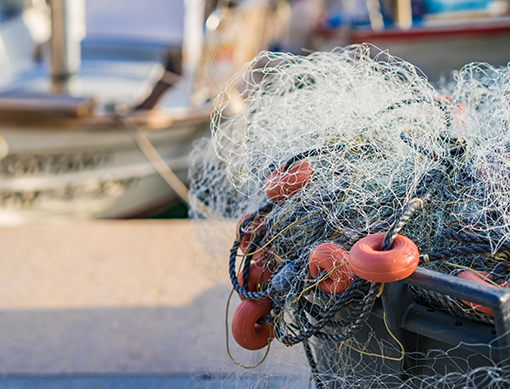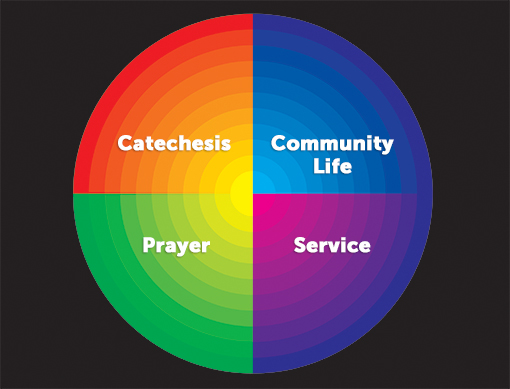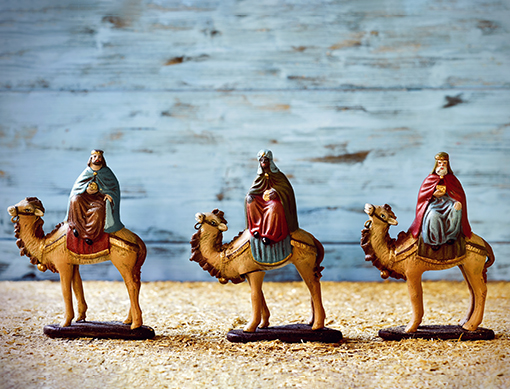Question of the Week - Third Sunday in Ordinary Time, Year B
Are there times you just don’t want to be interrupted? Maybe you’re in the middle of a good book, a favorite TV show, an exciting football game, or working on a project you enjoy when you hear someone calling your name, or the phone rings, or there’s a knock at the door. Inwardly you groan and think, “Leave me alone!” I’m sure we’ve all felt this way from time to time.
As I read today’s Gospel (Mark 1:14-20), I am struck by two things. First, the disciples allowed themselves to be interrupted. Yes, there was work to be done, and yes, they were in the middle of that work, but when they heard Jesus’ invitation, they somehow knew that it was more important than the task at hand. Second, I am mindful of what they left behind: nets and boats, which were the source of their livelihood, and even their own father! 
In a similar way, Jesus invites us many times a day to drop what we’re doing and to simply follow him—to call a friend who’s still isolated because of the pandemic; to talk with him in prayer; to hug our children, really listen to our spouse, run an errand for a neighbor, or keep a promise to a friend. I wonder how many times I am so engrossed in what I am doing that I fail to hear his call or ignore his invitation to serve?
Tomorrow is the Feast of the Conversion of Saint Paul. As we all know, Saul (Paul) had to be knocked from his horse and blinded in order for God to get his attention. Hopefully, that’s not what it will take for God to get our attention too! But as we think about our ongoing need for conversion, perhaps this is a good day—a good week—to pray, “Lord, change my heart. Help me see what I view to be interruptions as invitations to follow you. Help me always be willing to drop what I am doing in order to answer your call. Amen.”
Mary Sellars Malloy has over forty years’ experience as a Catholic educator and lay minister. She is a frequent workshop presenter on prayer, liturgy, spirituality, the Sacraments, and the RCIA. Also, Mary leads retreats and parish missions throughout the country. Her goal is to encourage Catholics of all ages to appreciate and to live their Catholic faith.
Saturdays were my favorite day as a child. It meant time spent with my mom, or dad, or both, usually shopping for groceries, buying the latest Nancy Drew volume and, eventually, grabbing a bite to eat at the local diner.
Looking back, I realize how much of my time with them was filled with lessons, not only taught on-purpose but caught from listening to their conversations, which usually included some funny story relayed by my dad.
As with most couples, there were lots of observations about people they knew – relatives, friends, and co-workers. My father almost always shared something from his days at work, like the time a co-worker thought it would be funny to pound on the restroom door when the boss was inside, only to have the door break off the hinges and fall on their seated boss.
My dad would inevitably describe someone as a good person or an old fool.
For the good person, the bottom line was always a heart that meant well, in spite of shortcomings and mistakes. The old fool, on the other hand, was self-focused, making decisions that rarely took others into account.
Undoubtedly, we have all been or will be, the old fool at one point or another, differing only by degrees. The danger lies in foolishness that becomes a habit, a way of life that destroys our willingness to seek forgiveness for what we have done, or, what we have failed to do—or even admit to ourselves that we have fallen short of our responsibilities and promises to God.
Scripture has a lot to say about fools, particularly about the several types of fools described by varying Hebrew words. Scripture also teaches there is one way to overcome being a fool: Choose wisdom.
Choosing wisdom, Proverbs explains, requires seeking wisdom, an effort of mind and heart:
“…if you receive my words and treasure my commands, turning your ear to wisdom, inclining your heart to understand; Yes, if you call for intelligence, and to understanding raise your voice; If you seek her like silver, and like hidden treasures search her out, then will you understand the fear of the Lord; The knowledge of God you will find; For the Lord gives wisdom…”
Seeking wisdom is really a life-long journey, one that requires two traits, as identified by the saints.
St. Thomas Aquinas reminds us: “Where there is humility, there is wisdom.”
Additionally, teaches St. Augustine, “Patience is the companion to wisdom.”
And, in all endeavors, we should open our hearts in prayer to the power of the Holy Spirit.
Mary Regina Morrell is a Catholic journalist, author, and syndicated columnist who has served the dioceses of Metuchen and Trenton, New Jersey, and RENEW International in the areas of catechesis and communication.
Question of the Week - Second Sunday in Ordinary Time, Year B
I expect that if I asked twenty Catholics to answer today’s question, I would hear twenty different answers. “Love,” some might say. “Serve.” “Obey the Ten Commandments.” “Go to Mass.” “Confess your sins.” And which of the multitude of responses would be correct? Why, each one, of course!
Correct, yes, but taken on their own, incomplete.
When I am asked to lead a workshop or day of reflection for RCIA (Rite of Christian Initiation of Adults) directors and catechists, I often begin by asking them to draw a circle and to divide the circle into four equal sections. Then I invite them to label each section with one of the following words or phrases: catechesis (based on the liturgical year); community life; prayer (and reflection on the Word of God); and service. These are the four ways the Church herself says that we are to form, guide, and train catechumens and candidates in Christian life. Each of the four is equally important in mentoring disciples and leading them to maturity of faith. (See RCIA paragraph 75.)
Those four ways of growth should apply to those of us who are lifelong Catholics too! As we stand at the start of the new year, with Lent not too many weeks away, perhaps we could each draw our own circle, label the same four sections, and ask ourselves, “What am I doing to grow in faith? How have I matured in each of these areas of discipleship? What could I do at this time in my life to become a more committed follower of Jesus Christ?”
Tomorrow, January 18, is the beginning of the Week of Prayer for Christian Unity. The theme for this year’s Week of Prayer is “Abide in my love . . . you shall bear much fruit.” Pray this week for the Church throughout the world and for the unity of Christians.
Mary Sellars Malloy has over forty years’ experience as a Catholic educator and lay minister. She is a frequent workshop presenter on prayer, liturgy, spirituality, the Sacraments, and the RCIA. Also, Mary leads retreats and parish missions throughout the country. Her goal is to encourage Catholics of all ages to appreciate and to live their Catholic faith.
Among all the lessons that Scripture offers us, perhaps none is more consistent than the need to embrace change.
With God, change is not just a fact of life. It is a tool in Divine Hands. Just look at Noah, Abraham, Moses, Mary and Joseph, and the Apostles. God entered their lives and asked each of them to let go of what was so they could embrace what would be through the power of God’s Spirit.
Without their willingness to put their faith in God, the world would certainly look different today. What if Noah laughed himself silly at God’s request to build the ark? Or if Abraham planted his feet firmly on the land he already owned, refusing to leave all he had worked for just because of God’s whim?
Imagine if Moses let his insecurities rule the day and prevent him from going to the pharaoh and demanding the release of the Hebrew people? What if Moses had given in to the people’s grumbling about the Exodus' hard life and let them go back to Egypt to live in persecution?
And then there is Mary, our Blessed Virgin. Where would we be if, in fear, she said no to the Angel Gabriel? Or if Joseph took advantage of his right to divorce her because of her pregnancy, rather than accept this unexpected change in plans?
And the 12 ordinary men who were the Apostles—what changes did they embrace in their lives to accept the invitation of Jesus to “come and see?” Leaving behind family and friends and livelihood wasn’t the only new path they needed to walk. The most significant change, and one that Jesus requires of each of us, is a change of heart and mind. This change must be a profound one, made with a deep understanding of how individual lives and the whole people of God will be transformed by living in Christ and walking with God in a new way.
St. Paul says it beautifully in his letter to the Corinthian community: “So whoever is in Christ is a new creation: the old things have passed away; behold, new things have come” (2 Cor. 5:5:17).
In all circumstances of change, we can take comfort in knowing that God continues to use each of us and every situation to bring about God’s kingdom. The pivotal factor in God’s work is our response.
For the coming year, an important question for our faith lives may be a simple one: When we are faced with change, how will we respond?”
Mary Regina Morrell is a Catholic journalist, author, and syndicated columnist who has served the dioceses of Metuchen and Trenton, New Jersey, and RENEW International in the areas of catechesis and communication.
Question of the Week - The Feast of the Baptism of the Lord
Well, here we are at the end of the Christmas season. One last day to recall one of my favorite Christmas songs and movies, “Rudolph the Red-Nosed Reindeer,” where Santa sings of others not letting Rudolph join in the reindeer games. Now one might think, “How childish!” However, have you ever experienced such treatment as an adult? I know I have!
Before the pandemic, I enjoyed playing Mah-Jongg at our local library every Friday afternoon. Newly retired, I thought it would be a great way to meet new friends who share my passion for the game. About a dozen of us, all women except for a gentleman I will call Keith. Keith was a long-time Mah-Jongg player who had recently suffered a traumatic brain injury due to a severe bike crash. He had difficulty walking, and every movement—even reaching to pick up Mah-Jongg tile—was painfully slow. This man who once played in Mah-Jongg tournaments quickly lost his train of thought in the middle of a game. Because of this, a few members of the Friday afternoon group refused to play the game with him.
Two other players and I quickly made it a point to sit at Keith’s table. Yes, the play was slower than usual, and yes, sometimes we would have to help Keith figure out what he needed to do, but over the weeks and months, we learned that Keith had a wonderful sense of humor. Our Friday play was filled with laughter and fun. The man who, like Rudolph, had been excluded from playing at others’ game tables came to be a friend I looked forward to seeing week after week.
Our baptismal call demands that we make room at the table—room for those we find it easy and fun to be with and room for those who challenge us. What Keith taught me is that many times, when we make room at the table for those whom we find to be difficult, we discover unexpected blessings of friendship and joy.
This week, ask the Lord to reveal to you those who need your gifts of friendship, inclusion, and invitation. Make room at the table, and prepare to be blessed!
Mary Sellars Malloy has over forty years’ experience as a Catholic educator and lay minister. She is a frequent workshop presenter on prayer, liturgy, spirituality, the Sacraments, and the RCIA. Also, Mary leads retreats and parish missions throughout the country. Her goal is to encourage Catholics of all ages to appreciate and to live their Catholic faith.
The Feast of the Epiphany is one of my favorite feasts of the liturgical year. It is a feast rich with meaning and commemorates, among other things, the adoration of the three magi who travel to Jerusalem looking for the newborn King of the Jews. They had seen his star in the sky and had traveled many miles to do him homage. Their searching would lead to the revelation of the Son of God to the gentile people.
So, I was more than happy when my acapella group chose Epiphany as our name.
We are a small group of friends who have sung together for more than 20 years. We have ventured out together to places unknown to bring the gift of song to others, as a ministry to nursing homes, senior centers, or parishes. On the way, we always sought out experiences of meaning and learned new music that would bring comfort and joy, and hopefully, an encounter with Jesus, to those who heard us.
In that way, we could relate somewhat to the Magi, who set out together to find Jesus and understand his birth's meaning. Imagine how surprised they were to find the child, the King of the Jews, in the humble place of his birth in Bethlehem, hidden from public view, his birth known first to the lowly shepherds who were led by angels to visit the child well before the Magi, the respected wise men, arrived.
It is expected, I suppose, that in our culture, we look to those who are held up as influential, powerful, and well-off for leadership, but it is telling that God’s son came to us as a baby, came to us in poverty, came to us in a stable. God has a habit of revealing himself among and within the humble and the poor and unexpected places.
With that in mind, today, I was inspired by the words of a pastor in his recent reflection: “This year we celebrated a Christmas Mass in a barn. This was to show that, with God, every barn could be a church, the savior could be in any or every man, and the last will be first in the Kingdom of God.”
As we begin our journey into a new year, let us remember one of the lessons of Epiphany, and not be surprised when we find Jesus standing in a very long line at the food pantry.
We need only recall Jesus’ own words, “Amen, I say to you, whatever you did for one of these least brothers of mine, you did for me,” and “… whatever you did not do for one of these, you did not do for me.”
Epiphany always reminds me that faith is a journey, sometimes an arduous one, where we are likely to discover the unexpected. Often the unexpected is God.
Mary Regina Morrell is a Catholic journalist, author, and syndicated columnist who has served the dioceses of Metuchen and Trenton, New Jersey, and RENEW International in the areas of catechesis and communication.
Question of the Week - The Solemnity of the Epiphany of the Lord
Over thirty years ago, I had the blessing of serving as pastoral associate at the Cathedral of the Sacred Heart in Richmond, Virginia. A part of my ministry was to run the food pantry and oversee the parish's outreach ministries. One of the women we served, Charlotte, often came by to sit in the warmth of the parish hall and chat a bit.
One frigid winter in Richmond, Charlotte was turned away from the women's shelter because she had started an argument with another resident. With colder-than-ever temperatures predicted and nowhere to go, Charlotte came to see me. Recognizing the danger of her situation, I asked my husband Michael if we could take Charlotte in for the next couple of nights. He agreed to this, so I set a time to meet Charlotte to take her to our home.
When I met Charlotte, she carried a bag with some clothes and something long and bulky, wrapped in a bath towel. I could not imagine what that was, but this I knew. When Charlotte got into my car, that bulky object filled the air with a not-so-pleasant odor. I cracked my driver's side window in order to breathe.
Arriving at our home, Charlotte was greeted by our German shepherd, whose nose immediately went to the bulky, towel-wrapped object. Charlotte proudly unwrapped the gift, a length of ring bologna. Knowing that I had to receive that gift with graciousness and gratitude, I explained that I already had our dinner planned, and then I wrapped the bologna in wax paper and foil and placed it in our refrigerator for future use. Charlotte seemed pleased by this.
Thirty years later, I still reflect on the lesson Charlotte taught me. On this day, when we sing of the gifts brought by the Magi, I understand that Charlotte's gift was just as precious as gold, frankincense, and myrrh. It was a lavish gift for a homeless woman to offer, and she offered it with much gratitude and love. Charlotte herself was Christ-present-to-us, reminding us that everyone has a gift to offer, and our hearts must always be ready and open to receiving whatever that gift might be.
Mary Sellars Malloy has over forty years' experience as a Catholic educator and lay minister. She is a frequent workshop presenter on prayer, liturgy, spirituality, the Sacraments, and the RCIA. Also, Mary leads retreats and parish missions throughout the country. Her goal is to encourage Catholics of all ages to appreciate and to live their Catholic faith.
Question of the Week - The Solemnity of Mary, the Holy Mother of God
Many months ago, I wrote of a little Lenten practice inspired by the Jewish tradition of berakah. Many Jews make it a practice to offer at least one hundred berakah, or “prayers of blessing” each day, using words we hear echoed in our Eucharistic Prayer: “Blessed are you, Lord God.” Their prayers might be as simple as, “Blessed are you, Lord God, for the gift of a new day” or “Blessed are you, Lord God, for the gift of electricity and the lamps that provide me with light when evening falls.”
It would be easy to dismiss the year 2020 as a year that seemed somewhat short of a blessing. The pandemic changed and challenged us, upended daily life as we knew it, forced the cancellation of plans and celebrations, and took the lives of many of our loved ones. We look back and wonder, “Where was God in the midst of all of this?”
Perhaps, in answer to the question, we could spend this week offering our berakah, our “prayers of praise” for the blessings of 2020. Doing so might help us remember that God has been and is right here, blessing us, loving us, providing for us, and leading us on our way.
Thus, I will begin. “Blessed are you, Lord God, for extra time with my husband. Blessed are you, Lord God, for longer conversations with friends. Blessed are you, Lord God, for time to create, read, and watch good movies. Blessed are you, Lord God, for more time to pray. Blessed are you, Lord God, for long rides on sunny Sunday afternoons. Blessed are you, Lord God, for the gift of a neighbor who wiped down our door handles and stair rails every day. Blessed are you, Lord God, for meaningful work. Blessed are you, Lord God, for the gift of our health. Blessed are you, Lord God, for time to try new recipes and the chances to share our favorite creations with friends.”
As we face the new year of 2021, I pray upon you the beautiful words of today’s First Reading (see Numbers 6:22-27): “The LORD bless and keep you! The LORD let his face shine upon you, and be gracious to you! The LORD look upon you kindly and give you peace!”
Mary Sellars Malloy has over forty years’ experience as a Catholic educator and lay minister. She is a frequent workshop presenter on prayer, liturgy, spirituality, the Sacraments, and the RCIA. Also, Mary leads retreats and parish missions throughout the country. Her goal is to encourage Catholics of all ages to appreciate and to live their Catholic faith.
by Mary Clifford Morrell
Many years ago, while our six sons were young and we were still adventurous, we drive across the country from New Jersey to Montana with our friends and their five children. When we were not taking a headcount, we were often spellbound by the magnificence of Creation that greeted us at every turn, reflecting the nature of our Creator—unlimited generosity, love, and potential.
God uses the lush, rolling hills of Virginia, the mystery of Devil's Tower, the rock art of the Bad Lands, the majestic rises and wildlife of the Grand Tetons, the expansive star-filled night skies of Montana, and everything in-between—the palette of living color and form to gift us with Creation continually. 
When we arrived home, and every year since, I have been blessed with an opportunity to reflect on Creation's potential whenever I see the unique weed tree on the corner opposite my house.
It began to grow up between the cracks of cement into the narrow metal track of a street sign, over which it now casts a delightful shadow. It comes to life every spring and has patiently grown from a single stem peeking out over the sign to a lush plant, whose leaf-filled branches belie its very slender trunk hidden within the metal track.
Its life reminds me of all life's potential, and therefore, each of us as God's children.
Sadly, for innumerable reasons, including a tendency to focus on our imperfections, many of us forget our divine nature, including the potential to grow even in the most challenging circumstances. Too often, our potential goes unmet, even unrecognized. Our creative spirit is often sublimated, and we feel sad or incomplete, not understanding why.
However, like the weed tree growing to new heights in the street sign, when we know who we are and what we were meant for, our need to grow will push us to break out in one way or another.
We are meant to live our divine nature, to live in communion with our God and each other. Our lives and our world could be healed and made whole if we could recover our sense of being sacred and recognize that wholeness and holiness are the same.
As we enter the New Year, which is always a time for hope, we might allow ourselves to be spellbound by the magnificence of Creation and remember that we are a part of the gift. We have the potential to grow and blossom within what may seem like the many cracks of our lives.
We can begin by having faith in ourselves and remembering the words of Saint Francis de Sales: "Have patience with all things, but chiefly have patience with yourself. Do not lose courage in considering your own imperfections but instantly set about remedying them — every day begin the task anew."
Mary Regina Morrell is a Catholic journalist, author, and syndicated columnist who has served the dioceses of Metuchen and Trenton, New Jersey, and RENEW International in the areas of catechesis and communication.
Question of the Week - The Holy Family of Jesus, Mary, and Joseph
Pulling into a parking spot at the fabric store, I opened my car door and was putting on my mask when an elderly woman rolled down her window, pointed to my car, and said, "I wish I had never gotten rid of mine. It was the best car I ever had." Now, you might think I drive some luxury vehicle, but the truth is that I drive a small 2014 hatchback with nearly 100,000 miles on it to date. We are not talking about anything fancy or new.
Delightfully, her simple comment opened the door for continued conversation. I asked her what good bargains she would found at the fabric store, and she explained that she had needed to purchase interfacing for masks she was making. These masks were going to workers at a local hospital where her brother works. Then, with a twinkle in her eye, she also shared that she had bought some Pittsburgh Steelers material to make three special masks for her brother. Now, you need to know that I live in the Cincinnati area, and the Steelers and Bengals are HUGE rivals. She and I had a good laugh over what she was doing, and she confessed that she was also making three Bengals masks to give to him after he first received those Steelers masks.
The conversation then turned to phones. Her children had insisted on buying her one of the newer models to both see and hear her grandchildren. She shared that she did not yet have the hang of how to make it all work, but she especially liked being able to see her grandbabies.
Before we knew it, about a half-hour had passed. She then said to me, "I hope you do not mind talking with me. I have been home alone and not going out, but I needed this interfacing. It was just good to talk with a real person today."
When we think about those who need our compassion and kindness right now, we might not think of those parked next to us in the parking lot. However, my parking lot experience is a good reminder that there are many opportunities to extend compassion and kindness as we go about every day's business. The invitation is to keep our eyes and ears open for the chances to listen, converse, encourage, and bless all who are a part of our family, the family of God.
Mary Sellars Malloy has over forty years' experience as a Catholic educator and lay minister. She is a frequent workshop presenter on prayer, liturgy, spirituality, the Sacraments, and the RCIA. Also, Mary leads retreats and parish missions throughout the country. Her goal is to encourage Catholics of all ages to appreciate and to live their Catholic faith.
Pagination
Latest
Categories
Archives
- February 2015 (2)
- March 2015 (2)
- April 2015 (5)
- May 2015 (3)
- June 2015 (6)
- July 2015 (3)
- August 2015 (5)
- September 2015 (5)
- October 2015 (4)
- November 2015 (2)
- December 2015 (1)
- February 2016 (2)
- March 2016 (1)
- April 2016 (2)
- May 2016 (2)
- July 2016 (2)
- August 2016 (2)
- September 2016 (1)
- October 2016 (5)
- November 2016 (1)
- December 2016 (3)
- January 2017 (2)
- February 2017 (3)
- March 2017 (2)
- April 2017 (1)
- June 2017 (2)
- July 2017 (2)
- August 2017 (1)
- April 2018 (1)
- October 2018 (2)
- December 2018 (2)
- February 2019 (3)
- March 2019 (2)
- April 2019 (2)
- May 2019 (3)
- June 2019 (1)
- July 2019 (16)
- August 2019 (8)
- March 2020 (4)
- April 2020 (6)
- May 2020 (8)
- June 2020 (7)
- July 2020 (5)
- August 2020 (7)
- September 2020 (4)
- October 2020 (5)
- November 2020 (9)
- December 2020 (11)
- January 2021 (10)
- February 2021 (8)
- March 2021 (5)
- April 2021 (4)
- May 2021 (4)
- June 2021 (5)
- July 2021 (2)
- August 2021 (3)
- September 2021 (4)
- October 2021 (4)
- November 2021 (2)
- December 2021 (5)
- January 2022 (4)
- February 2022 (4)
- March 2022 (9)
- April 2022 (7)
- May 2022 (9)
- June 2022 (12)
- July 2022 (7)
- August 2022 (10)
- September 2022 (9)
- October 2022 (11)
- November 2022 (8)
- December 2022 (7)
- January 2023 (2)
- February 2023 (10)
- March 2023 (9)
- April 2023 (10)
- May 2023 (8)
- June 2023 (4)
- July 2023 (3)
- August 2023 (2)
